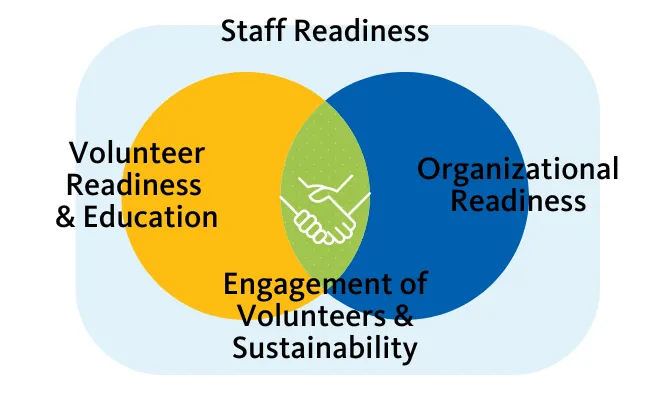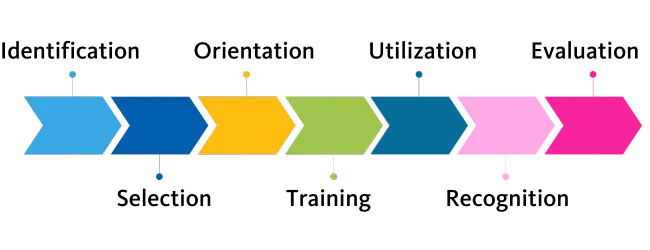The UC Master Gardener Program uses research-based practices in the extension of horticulture information but also to ensure effective leadership and management of volunteers. Two models, the ISOTURE model and the Volunteer Delivery Systems model form the foundation of our research-based approach.
Questions? Contact:
Marisa Coyne
Assistant Director, Volunteer & Community Engagement
macoyne@ucanr.edu
(530)750-1394
Volunteer Delivery System
A Volunteer Delivery System is a process for coordinating and supervising the work of volunteers. The system includes three main domains to achieve the program mission:
- staff readiness
- volunteer readiness
- organizational readiness
Where these domains overlap, we see the successful engagement of volunteers and the sustainability of the system. (Pictured above: Infrastructure to support a Volunteer Delivery System, adapted from Pleskac. S. et al. 2010)
ISOTURE Model
The ISOTURE Model was first developed by Robert Dolan, a professor at North Carolina State University. In 1971, It was introduced as a strategy for managing volunteers by Milton Boyce, the national program leader for 4H Youth Development. (7-step ISOTURE Model graphic below adapted from the Building Volunteer Engagement online course.)
The ISOTURE Model describes 7 considerations critical to the creation of effective volunteer engagement. These stages include:
- Identification
- Selection
- Orientation
- Training
- Utilization
- Recognition
- Evaluation
The Volunteer Delivery System and ISOTURE model can be used together to strengthen program implementation and outcomes. For example, efforts to improve equity in Volunteer Identification may include:
- Staff readiness: Compare UC Master Gardener Program volunteer and community demographics.
- Organizational readiness: Form a Volunteer Identification Work Team to develop and implement a recruitment plan (flyers, emails, informational presentations, and more).
- Volunteer readiness: Offer DEI training for current UC Master Gardener program volunteers.
Building Volunteer Engagement e-Course
UCANR’s Building Volunteer Engagement e-Course provides a deeper look at volunteer engagement theory and practice in the Extension context. UC Master Gardener Program personnel must complete Building Volunteer Engagement, an online course as part of their onboarding process.
After completing the 45-minute, self-paced course, learners will be able to:
- Describe the benefits volunteers provide to programs and organizations.
- Identify the roles and responsibilities of those involved in working with volunteers.
- Identify the characteristics of an effective volunteer program.
- Use the 7-step ISOTURE model to help build volunteer engagement.
Along the way, learners will assess their own volunteer program, using self-guided activities and resources, and develop a volunteer engagement action plan.
Coordinators can use this Resource Guide to access the Building Volunteer Engagement e-Course.


